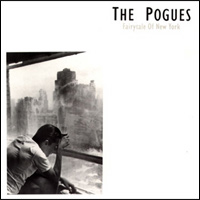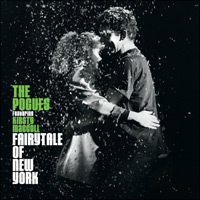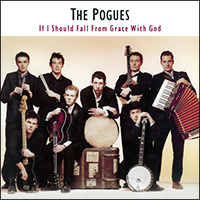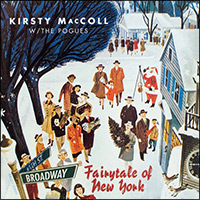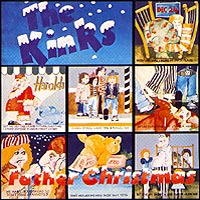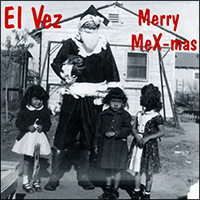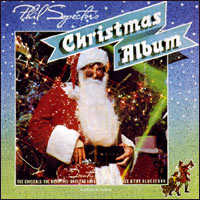
Songs & Singles: F
This index lists the essential songs (not all the songs) contained on the albums reviewed in Hip Christmas, plus singles, album tracks, or one-hit wonders not otherwise included on those albums. Whenever possible, the artist's name is linked to my review of the best Christmas album (not necessarily the only or original album) on which to find the song.
Barring that, the names will be linked to a place where you may buy the song (usually Amazon). If there's no link, it means that, to my knowledge, the song is not available, though used copies may be in circulation. Of course, the list will expand as I write more reviews. And, nothing's perfect - especially me and my crazy list. Please send additions, corrections, criticisms, and suggestions via email.
- Fa And A La (Gustafer Yellowgold, aka Morgan Taylor, 2012)
- Fairytale Of New York
- Ben Caplan & Katzenjammer (2011)
- Dollyrots (2019)
- Johnnyswim (2024)
- Pilate (2004)
- Pogues featuring Kirsty MacColl (1987) Top 100 Song [close]
- Stars (2005)
- Fall in Love At Christmas (Mariah Carey, Khalid & Kirk Franklin, 2021)
- Fan Club Flexi-Disc Recording (T.Rex, 1972)
- Fangsgiving (Happy Fangs, 2014)
- Far Away Christmas Blues (Little Esther Phillips with Johnny Otis, 1950)
- The Fat, Fat Man (Leslie Uggams, 1954)
- The Fat Man's Comin' (David Byrne, 2022)
- Father Christmas (Elastica, 1994)
- Father Christmas (The Features, 2004) [close]
- Father Christmas
- Bad Religion (2013)
- Cary Brothers (2009)
- Dave Davies (2023)
- Dead End Cruisers (1996)
- Figgs (1995)
- Kinks (1977) Top 100 Song [close]
- Lapdog (1999)
- CJ Ramone (2018)
- Riverboat Gamblers (2022)
- Two More Weeks (2010)
- The Vacancies (2008)
- Valencia (2010)
- Father Sgt. Christmas Card (Guided By Voices, 2002)
- Favourite Time (The Cords, 2024)
- Feast Of Lights (They Might Be Giants, 1999)
- Feelin' Sorry (My Morning Jacket, 2023)
- Feels Like Christmas (Al Green, 1983)
- Feels Like Christmas
- Michelle Malone (1998)
- Michelle Malone (2014)
- Michelle Malone (2020)
- Feliz Navi-Nada (El Vez, 1994) Top 100 Song [close]
- Feliz Navidad
- Baghdaddios (2008)
- Jose Feliciano (1970)
- Los Lonely Boys (2003)
- Los Straitjackets (2002)
- Satan's Pilgrims (2019)
- Voodoo Glow Skulls (1997)
- Felt Like Summer (But It Looked Like Christmas) (Peter Holsapple Combo, 2019)
- Festivus
- Albert & The Sleigh Riders (2016)
- Dictators (2021)
- The Festivus Song (Jingle Punx, 2021)
- A '55 Telecaster Under My Tree (Carlene Carter and John Jorgensen, 1992)
- Find Peace (Hannah Peel, 2014)
- Find Your Voice (Sarah McLachlan, 2024)
- Fireside (John Mark Nelson, Tancred & Jenny Owen Youngs, 2021)
- First Christmas (Diane Keaton, 2024)
- First Christmas Snow (Dill Bourbonridge, 1965)
- First Noël
- Crash Test Dummies (1991)
- Everly Brothers (1962)
- John Fahey (1982)
- Infant Kings (1997)
- Louvin Brothers (1961)
- Billy Pilgrim (1995)
- Judy Price (1984)
- Lou Rawls (1993)
- First Snowfall (Coctails, 1993)
- First Snowfall (Bing Crosby, 1955)
- The First Toymaker To The King (from "Santa Claus Is Coming To Town") (Joan Gardner, 1970)
- Five Pound Box Of Money (Pearl Bailey, 1959)
- Flappie (Todd Rundgren, 2020)
- Flying For Christmas (Jackopierce, 2019)
- Fool's Gold (Lucie Dacus, 2019)
- For The Love Of Others (Piney Gir, 2009)
- Forget It (Nadroj & The Wolrats, 1984)
- Forgive Me Santa (Jimmie Davis, 1966)
- From Our House To Your House (Red Foley, 1966)
- Frosty The Snowman
- Gene Autry (1950)
- Beach Boys (1964)
- Charms (2004)
- Cocteau Twins (1993)
- Nat King Cole (1950)
- Bing Crosby (1962)
- Jimmy Durante (1950 and 1969)
- Esquivel with The Skip Jacks (1959)
- Red Foley (1950)
- Frosted featuring Jane Wiedlin (1997)
- Jan & Dean (1962)
- Flaco Jimenez with Freddy Fender (1994)
- Man Or Astroman? (1994)
- Ronettes (1963) Top 100 Song [close]
- Dan Tyminski (2003)
- Uncle Kracker (2023)
- Ventures (1965)
- Whitney Wolanin (2012)
- Fruitcake (The Superions featuring Fred Schneider of the B-52's, 2010)
- Fuck Christmas (Fear, 1982) [close]
- Fuck It, It's Christmas (Faux Canada, 2019)
- Fuck U 4 Xmas (Christina Chong, 2023)
- Fuck You Kristmas! (Kim Wilde & Lawnmower Deth, 2017)
- Funky Christmas (Maceo Parker, 1990)
- Funky Christmas (Snoop Dogg with October London and Cocoa Sarai, 2020)
- Funky Christmas (Whispers, 1979)
- Funky Drummer Boy (Thornetta Davis, 1997)
- Funky Funky Christmas (Electric Jungle, 1974)
- Funky New Year (Eagles, 1978)
- Funky Xmas To You (J. Hines & The Boys, 1975)




